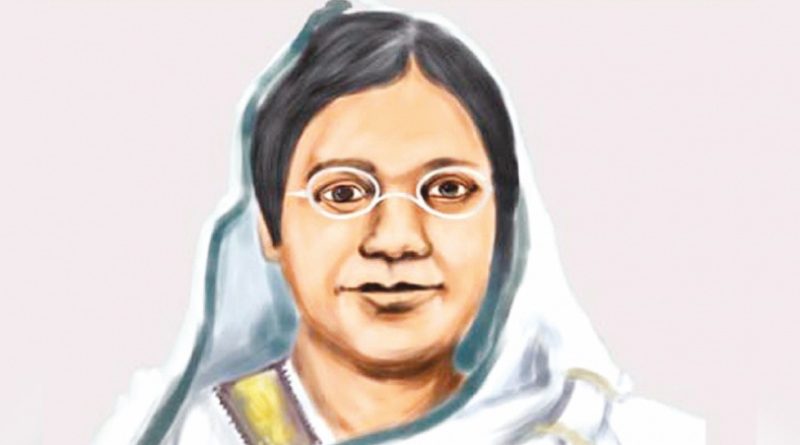Paragraph: Begum Rokeya
Begum Rokeya was a famous writer and a social worker. She lived in undivided Bengal in the early 20th century. She believed that women should have the same rights and opportunities as men have in the society. So she fought for their cause throughout her life. Begum Rokeya was born in a village called Pairabondh, Rangpur in 1880. Her father Jahiruddin Muhammad Abu Ali Haider Saber was an educated landlord. Rokeya was married to Khan Bahadur Sakhawat Hussain in 1896. Her husband was the Deputy Magistrate of Bhagalpur, now a district in the Indian state of Bihar. He was very cooperative, and always encouraged Rokeya to go on with her activities. Many upper class Muslims of Bengal at that time learnt Arabic and Persian as medium of education and communication. But Rokeya had great love for her mother tongue. She learnt Bangla and English from her eldest brother Ibrahim. Rokea established a high school in her beloved husband”s memory, naming it Sakhawat Memorial Girls” High School. It started in Bhagalpur, a traditionally Urdu-speaking area, with only five students. She also founded the Anjuman e Khawateen e Islam (Islamic Women”s Association), which was active in holding debates and conferences regarding the status of women and education. In her life, she remained busy with the school, the association, and her writings for the rest of her life. She died of heart problems on December 9, 1932. In Bangladesh, December 9 is celebrated as Rokeya Day in her Memory.
Or,
Begum Rokeya was a famous writer, a social worker, feminist and a social worker in undivided Bengal in the early 20th century. She is most famous for her efforts on behalf of gender equality and other social issues. She was born in 1880 in the village of Pairabondh, Rangpur, in what was then the British Indian Empire and is now Bangladesh. Her father, Jahiruddin Muhammad Abu Ali Haidar Saber, was a highly educated landlord. Roquia had two sisters, Karimunnesa Khatun and Humayra Khatun; and three brothers, one of whom died in childhood. Roquia”s eldest brother Ibrahim, and her immediate elder sister Karimunnesa, both had great influence on her life. She believed that women should have the same rights and opportunities as men have in the society. So she fought for their cause throughout her life. She was married to Khan Bahadur Sakhawat Hussain in 1896. Her husband was the Deputy Magistrate of Bhagalpur, now a district in the Indian state of Bihar. He was very cooperative, and always encouraged Rokeya to go on with her activities. Many upper class Muslims of Bengal at that time learnt Arabic and Persian as medium of education and communication. But Rokeya had great love for her mother tongue. She learnt Bangla and English from her eldest brother Ibrahim. She launched her literary career in 1902 with a Bangla story entitled Pipasa (Thirst). Rokea established a high school in her beloved husband”s memory, naming it Sakhawat Memorial Girls” High School. It started in Bhagalpur, a traditionally Urdu-speaking area, with only five students. She also founded the Anjuman e Khawateen e Islam (Islamic Women”s Association), which was active in holding debates and conferences regarding the status of women and education. In her life, she remained busy with the school, the association, and her writings for the rest of her life. She died of heart problems on December 9, 1932. In Bangladesh, December 9 is celebrated as Rokeya Day in her Memory.

